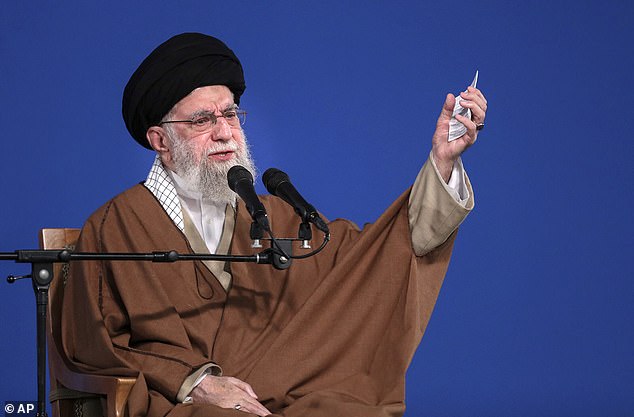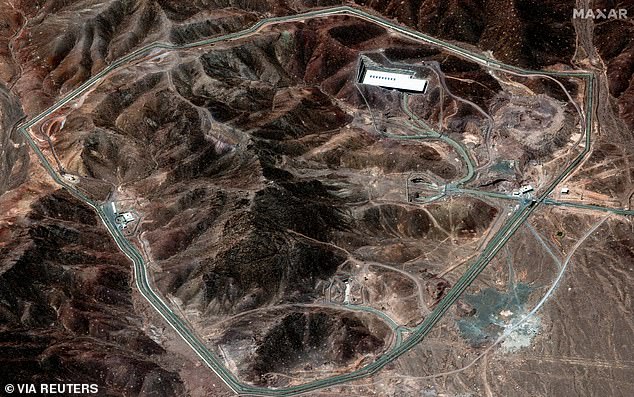As American ‘bunker-busting’ bombs rained down on three major Iranian nuclear enrichment facilities last night, the face of the Middle East changed forever.
Israeli Prime Minister Benjamin Netanyahu has finally got his wish: the US is at war with Iran.
It is too soon to measure the success of last night’s bombing campaign. Fordow – a uranium enrichment plant hidden in a remote mountainous region of central Iran – was struck in the attack, along with two smaller sites: Natanz and Isfahan.
The entrances to these facilities have been reduced to rubble, meaning they are unusable in the short term. However, the facilities themselves are buried deep underground and only time will tell whether they remain operational or not.
So what on earth happens next?
US involvement is ostensibly aimed at accelerating an end to a regional conflict which started with Israel pre-emptively bombing Iran nine days ago and which has since seen the two nations exchange near-constant bombardments since.
Some moderate Iranians may well see this as an opportunity to ‘call it a draw’ with the Islamic Republic of Iran still intact, but the tub-thumping rhetoric coming out of Tehran this morning suggests this is not a position endorsed by the all-powerful supreme leader, Ayatollah Ali Khamenei.

Some moderate Iranians may well see this as an opportunity to ‘call it a draw’ with the Islamic Republic of Iran still intact, but the rhetoric coming out of Tehran this morning suggests this is not a position endorsed bysupreme leader, Ayatollah Ali Khamenei
Iran knows that a land invasion from Western forces is incredibly unlikely. Israel does not have the capacity to carry out such an operation without US support and Republican voices back in Washington have long been warning President Trump against getting involved in another ‘forever war’ in the Middle East. And don’t forget, this is a president who ran on a manifesto of ending the wars in Gaza and Ukraine within 24 hours of taking office.
Some hardline Iranians will believe – righty or wrongly – that they can absorb a prolonged bombing campaign by Israel and the US for some time. Provided there is no attempt at a full-scale invasion, Iran’s top-brass might well feel the regime – despicable as it is – faces no existential threat and therefore has no need to negotiate.
Iranian missile attacks on Israel continue to cause severe disruption. Just this morning, the Iranian Revolutionary Guard succeeded in striking three targets, including the strategically vital port of Haifa – which has been hit on each of the past five days at a cost to Israel of hundreds of millions of dollars.
Despite Israel’s so-called ‘David’s Sling’ system to stop ballistic missiles, the new Iranian warheads nicknamed ‘Khaybar’ – after a famous Muslim victory over Jewish forces in the 7th century – have hypersonic capacity and have had some success in evading Israeli defences.
It only requires a handful of Khaybar missiles to strike Israel each day for life in the country to virtually grind to a halt with civilians rushing to bomb shelters throughout the day and night.
A war of economic attrition, with the two sides exchanging blows from the air, is perhaps the most likely outcome of what is already a dire situation.
What Iran decides to do next largely rests on who is actually in charge. Targeted ‘decapitation’ strikes by Israel against senior members of the Iranian regime have left the chain of command in tatters.
Supreme leader Ayatollah Ali Khamenei, now 86 years old, is believed to have gone into hiding underground and appointed three potential successors to his rule. The influence of the Ayatollah is absolute and his control extends to appointing senior figures in the judiciary, media and military.

Fordow – a uranium enrichment plant hidden in a remote mountainous region of central Iran – was struck in the US attack, along with two smaller sites: Natanz and Isfahan
Even if Khamenei does sue for peace, he could face trouble at home. The Iranian Revolutionary Guard has suffered serious losses within its own ranks and among its proxies such as Hezbollah. The last thing on their mind is peace. Should the army find itself at odds with an ageing and ailing Ayatollah, the US should remember that any regime change would not necessarily be for the better.
Britain’s Foreign Secretary David Lammy has urged Iran to show restraint. And so he might. For as Iran weighs up its options, Lammy will be all too acutely aware that Khaybar missiles can easily reach the UK’s two military bases on nearby Cyprus, Episkopi and Dhekelia.
If Iran wanted to warn Trump about the consequences of US intervention, it may well see an attack on a British sovereign base as a smart move.
The arrest of a man with joint British/Azerbaijani citizenship in Cyprus on suspicion of spying for Iran only proves that the regime has Britain in its sights.
Such an attack would almost certainly be unwise, but this morning the world woke up to a new reality. America is at war with Iran and the gloves have come off.
- Mark Almond is director of the Crisis Research Institute, Oxford.












